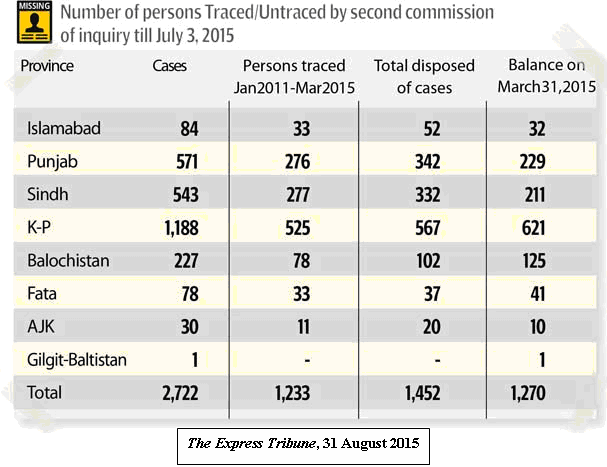August 30 marks the International Day of the Victims of Enforced and Involuntary Disappearances. Many families of the disappeared await the return of their loved ones; many have waiting for a decade or more. Unfortunately, for families that have had loved ones picked up by security agencies, the ordeal begins when they register a complaint; the entire state machinery becomes operational to silence and threaten the suffering family.
This year’s official figure of the “untraced”, as it stands on July 2015, is 1,270. This figure is but the tip of the vast iceberg in the deep dark waters that is Pakistan today.

http://tribune.com.pk/story/947882/enforced-disappearances-victims-families-share-their-ordeal/
The most difficult issue in addressing enforced disappearances is that the practice is largely un-documented. The “disappeared” individuals are not charged with any crime, and they never appear before any magistrate to challenge their detention or plead their innocence. They are not registered by State authorities, their whereabouts are kept unknown, each intelligence agency is unaware about the people disappeared by the other, and the victims are held indefinitely. Furthermore, the families of the victims cannot offer help, as they are denied any information on the whereabouts of their loved ones. According to Mr. Ban Ki Moon “there are controversies both on the figures and on the nature of the practice of enforced disappearances.”
Despite assurance, the federal government has maintained disinterest on the issue and with respect to the recovery of missing persons. Pakistan’s former Attorney General Munir A. Malik had given top priority to missing persons during his tenure and formed a “missing persons cell” in the AGP – headed by former Attorney General Tariq Khokhar. However, incumbent Attorney General Salman Aslam Butt has shut down the missing persons’ cell in the AGP office. The task force, formed by the former AG to sort out the issue, was wound down after Mr. Malik’s resignation.
The intelligence agencies have now devised a new method to discourage families from approaching court. Mutilated and tortured bodies begin cropping up when the families of the missing person approach the court. On the occasions the court has ordered the agencies to present the missing person in court, the victim’s dead bodies are found dumped in a deserted area. In some cases, acid has been thrown on faces to conceal victims’ identities; others have been threatened into silence.
During a hearing of a missing person’s case, a bench of Supreme Court was informed by the Commission on Enforced Disappearance that 4,557 bodies have been recovered from all over the country during the last five years, 266 of which have remained unidentified. According to Mr. I.A. Rehman, Chairperson, Human Rights Commission of Pakistan (HRCP), the situation has become grave, especially in Khyber-Pakhtunkhwa, following the Swat operation.
Pakistan has not signed the, International Convention for the Protection of All Persons from Enforced Disappearance, which has been signed by 57 countries, including India. The convention affirms unequivocally that the use of enforced disappearance is illegal under any circumstance, including war, internal political instability, or any other public emergency. Article 4 of the Constitution provides the following:
“Right of individuals to be dealt with in accordance with law, etc.
(1) To enjoy the protection of law and to be treated in accordance with law is the inalienable right of every citizen, wherever he may be and of every other person for the time being within Pakistan.
(2) In particular-
(a) No action detrimental to the life, liberty, body, reputation or property of any person shall be taken except in accordance with law…”
In many Asian countries, a culture of legal, moral, and political impunity exists for the crime of enforced disappearance and emphasizing that impunity dangerously corrodes the rule of law. Enforced disappearances undermine the deepest values of any society committed to respect the rule of law and human rights, and that the systematic practice of enforced disappearances is recognized as a crime against humanity under international law. Any act of enforced disappearance is an offence to human dignity and a grave and flagrant violation of multiple human rights guarantees, including the right to recognition as a person before the law, the right to liberty and security of the person and the right not to be subjected to torture and other cruel, inhuman, or degrading treatment or punishment.
The AHRC calls upon the State and international community to play its role in curbing the rising trend in enforced disappearances. Since 9/11, Pakistan has been actively engaged in a proxy war that has caused many innocent victims to languish in internment centres, unaware of their crime or fate. Thousands of lives have been lost and many families mourn the disappearances of their loved one who have gone without a trace. It is the duty of the State to ensure all citizens are dealt in accordance with law and that they enjoy full protection of the rights guaranteed under the Constitution as well as the other international conventions. However, the State of Pakistan, instead of protecting its citizens, has given full support and impunity to the law enforcement agencies.